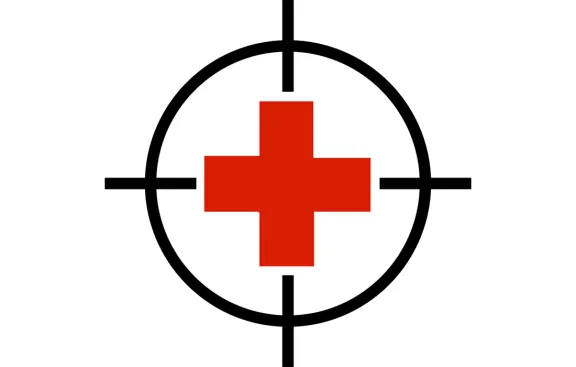
Doctors Under Fire
As future medical professionals, it is imperative that we stay informed of the rapidly changing landscape of medical aid in zones of conflict.
The intentional targeting of health care workers and patients in medical settings can in no way become the new-normal. While speaking out against these issues is a first step, much more needs to be done on both a national and international level to effect sustainable change.
The role of medicine in war is a complicated one. As a discipline, medicine has served to both inflict and relieve suffering throughout history. During World War II, the production of methamphetamine based drugs such as Pervitin by Nazi pharmacists aided in keeping soldiers awake for days on end.
The Allies had similar issues with medically sanctioned drug abuse – an estimated 72 million amphetamine pills were consumed by bomber pilots and soldiers over the course of the war. In addition, the infamous Nazi experimentation on prisoners of war, gay men, children, and people with disabilities continues to leave a dark stain on the history of modern medicine.
In response, the establishment of the Nuremberg Code in 1947 led to the foundation of modern medical ethics, which continues to guide both research and clinical practice in Western medicine. In conjunction, The Geneva Conventions have provided guidelines, particularly in the case of war, on preserving the sanctity and neutrality of medicine to aid those in need.
In fact, Article 12 is specifically dedicated to the provision of care of the wounded and sick. In addition, the International Committee of the Red Cross has established an advisory service on international humanitarian law stating:
“Personnel engaging in medical tasks must always be respected and protected, unless they commit, outside of their humanitarian function, acts that are harmful to the enemy. ...Parties to an armed conflict may not impede the provision of care by preventing the passage of medical personnel. They must facilitate access to the wounded and sick, and provide the necessary assistance and protection to medical personnel. Medical personnel may not be punished for providing impartial care.”
Escalating conflict in the Middle East however, has underscored an alarming reality – while international guidelines to protect the provision of medical services during war exists, there is rampant disregard of these guidelines and little is being done to ensure that they are enforced.
On October 3rd, 2015 a U.S. airstrike on a Médecins Sans Frontières (MSF) hospital in Kunduz, Afghanistan killed 30 people. Even now, the Pentagon refuses to categorize the attack as a war crime. In August of 2016, another airstrike on an MSF hospital in Yemen killed 11 patients and MSF staff.
Stories like these abound and the WHO has released statements condemning such attacks on practically a monthly basis since 2012. A WHO report on attacks on health care facilities found that from January 2014 to December 2015, there were 594 reported attacks on health care that resulted in 959 deaths and 1561 injuries in 19 countries with emergencies. In addition, it is estimated that 62% of the attacks were reported to have intentionally targeted health care facilities.
Recently, increasing concern over these incidents has focused on targeted attacks on hospitals in Syria. In August of 2016, the last remaining physicians in Eastern Aleppo released an open letter to President Obama stating the following:
“Last month, there were 42 attacks on medical facilities in Syria, 15 of which were hospitals in which we work. Right now, there is an attack on a medical facility every 17 hours. At this rate, our medical services in Aleppo could be completely destroyed in a month, leaving 300,000 people to die.
“What pains us most, as doctors, is choosing who will live and who will die. Young children are sometimes brought into our emergency rooms so badly injured that we have to prioritize those with better chances, or simply don’t have the equipment to help them. Two weeks ago, four newborn babies gasping for air suffocated to death after a blast cut the oxygen supply to their incubators. Gasping for air, their lives ended before they had really begun. Despite the horror, we choose to be here. We took a pledge to help those in need.”
It appears that this letter foreshadowed the worst possible outcome. In November 2016, the UN reported that the last remaining hospital in Eastern Aleppo had been destroyed, leaving 300,000 people without access to appropriate medical services.
The disturbing trend of targeted attacks on hospitals and medical providers is problematic for a number of reasons.
Deliberate attacks on foreign aid workers and volunteers, including those on MSF facilities, are likely to limit the already inadequate supply of aid and medical services to areas that are most in need. Medical services in war zones overwhelmingly benefit civilians. Hospitals often serve as the last bastion of hope for residents trapped in war-torn regions. The preservation of hospitals as neutral zones is therefore vital to alleviate unnecessary suffering in regions of conflict.
Intentional attacks also undermine any legitimacy of international law in regard to ethical codes of conduct during war.
Recently the International Committee of the Red Cross felt it necessary to release a statement reiterating the longheld understanding among warring factions that, “Medical units, such as hospitals and other facilities that have been set up for medical purposes, must be respected and protected in all circumstances. Medical units may not be attacked and access to them may not be limited.”
While well intentioned, this is a reminder that certain fundamental humanistic values that we feel should always hold true are being thrown by the wayside in conflict zones.


